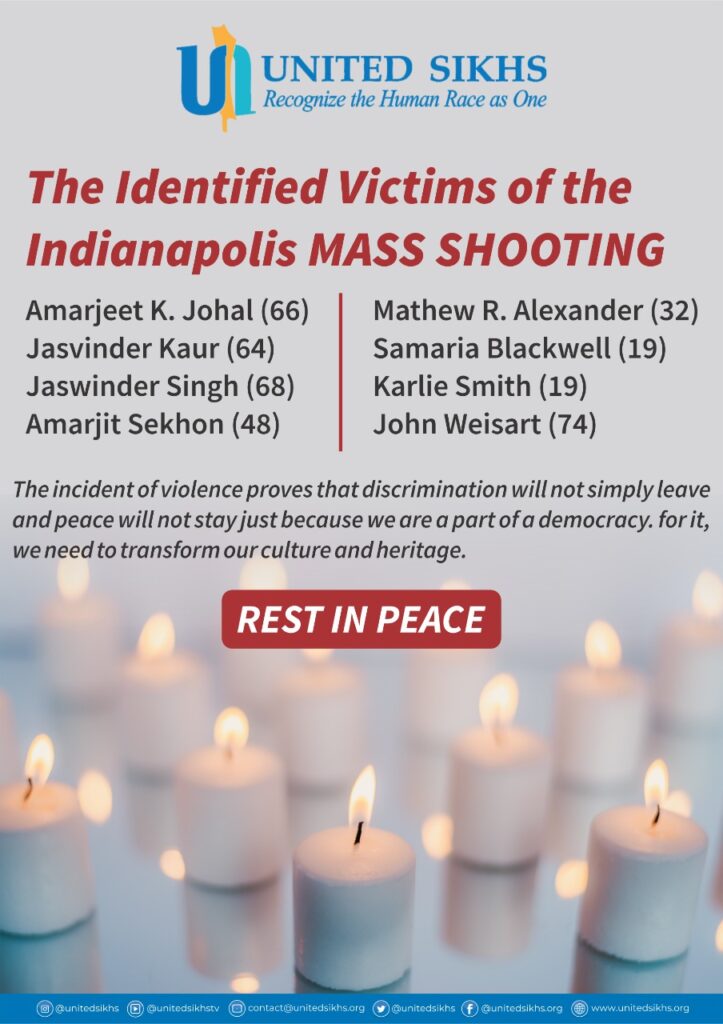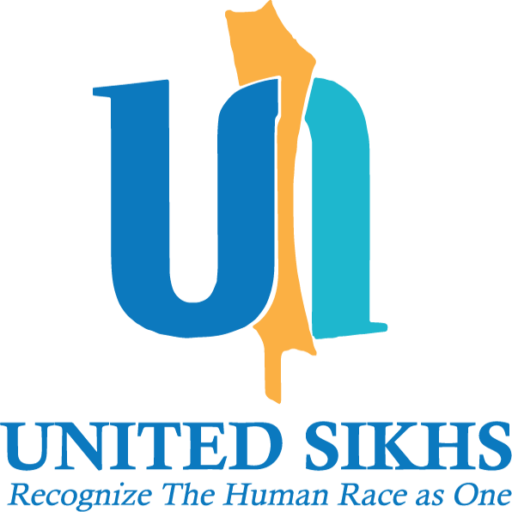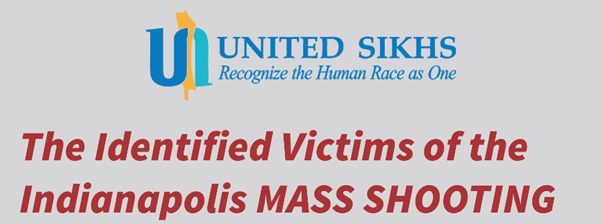
Dated : April 18, 2021
New York, NY
On April 15, 2021, a shooting at a FedEx facility in Indianapolis, Indiana left eight innocent people dead, including four Sikhs. Federal, state and local actors are calling for more gun control. In the meantime, UNITED SIKHS renewed its calls to Congress and the Executive branches at the state and federal levels to declare gun-related and hate-based crimes involving religion, race, ethnicity and gender and gender orientation intolerance a national crisis.
This type of violence is tragic and not new to the Sikh community in the United States. Sikhs have been the targets of hate crimes, especially after 9/11 when a new wave of race and ethnicity based attacks began to plague the community. “In fact,” states Ms. Jaspreet Kaur, a civil and human rights activist in New York, “9/11 will probably be remembered by the Sikh community as the start of the Sikh Civil Rights Movement in the U.S. because following 9/11 Sikhs were being targeted and it was a wake-up call that Sikhs in the U.S. needed to mobilize.”
This tragedy also follows a spike in hate crimes against the Asian-American community stemming from the spread of false and nonsensical rhetoric that blamed them for the COVID-19 pandemic. “It’s time this country implements strategic and systemic changes to address these crimes that continue unabated,” stated Ms. Kaur. “Gun violence affects all communities and gun violence committed because of creed, ethnicity, gender orientation and gender hate and intolerance must be addressed.”
“To abate hate-based crimes and the senseless deaths occurring in this country, everyone must support action at the state, federal and local levels,” stated Wanda Sanchez Day, UNITED SIKHS Chief Legal Officer and National Legal Director. “Specifically, with respect to hate crimes and gun violence, we as a nation should strengthen gun laws to remove them from the hands of people who are prone to violence and inciting hate, and those with a history of mental health impairments.”
While law enforcement are not calling the Indianapolis shooting a hate-based crime at this time, the Sikh community is fearful and are renewing calls for adequate funding and collection of data about hate crimes and hate incidents that can inform a national plan of action. “Funding, training, proper documentation and a willingness to investigate whether hate crimes are a motive in many cases is necessary,” stated Ms. Sanchez Day. “We anticipate a thorough investigation and hope it will shed light on the facts of this crime against innocent people, many of whom were Sikhs and who on that day were simply going about their lives.” In the meantime, we are thankful for the outpouring of support from our civil rights partners like the Anti-Defamation League and others,” she stated.
“Without complete data, law enforcement are not properly equipped to know whether there were hate motives for the senseless attacks like the one in Indianapolis. In this case, we are told that a disgruntled employee suffering from mental illness was the perpetrator but we know these things do not occur in a vacuum,” stated Ms. Kaur.
In a recent report, UNITED SIKHS outlined recommendations shared by civil rights leaders in the United States, including the State Attorney Generals of 35 of the 50 States, that the U.S. Congress enact laws that focus on better hate crimes data collection. It also called for Congress to devise methods for addressing the racial divisions that are fracturing the U.S. societal fabric. These recommendations include:
- Declare and treat the increase in hate crimes as a national crises;
- Call for Congress to provide funding for reliable statistics that will enable government to properly understand, investigate, and prosecute hate crimes;
- Systematically document all hate crimes, and hate incidents and the actual identity as well as the perceived identity of the victims;
- Devise incentives that encourage full and accurate data gathering of hate crimes and hate incidents at all levels of law enforcement and in all communities;
- Provide proper funding for necessary resources to aid survivors;
- Ensure that respect for religion, gender, racial, and ethnic diversity is a national, state and local government priority by requiring such statements in all government publications and laws and by affirmatively teachings race, gender and ethnic tolerance in all school curriculum;
- Reject efforts to create domestic terrorism legislation that authorizes unconstitutional searches and monitoring of private individuals;
- Remove weapons from the reach of young adults, persons with known mental health impairments and persons who are known to engage in hate based violence; and
- Provide reparations to communities that have been historically the victims of hate crimes and discrimination.
Congressional and State legislations have already been introduced and have the support of Democrats and Republicans. These aim to improve the national law enforcement hate crimes reporting systems, to train law enforcement on investigating hate crimes, to create hate crimes helplines and to expand resources for victims of hate crimes. “This is a step in the right direction,” stated Ms. Kaur, but what are leaders doing to protect the community while they are figuring this out?”
The Sikh community has been subjected to discrimination and random, deadly attacks for many years. In this case, witnesses state that the gunman was aware that many Sikhs worked in the FedEx facility and that there might be a religious-ethnic hate motive. The uncertainty leaves a community, prone to senseless attacks, afraid and apprehensive. In situations like this, there is a need for law enforcement to widen the net of their investigation. Without fulsome data collection about hate crimes and hate incidents in the community where these crimes occur, and without appropriate funding to address the issue, law enforcement is hindered in significant ways,” states Ms. Sanchez Day.
Some families of the victims must also wait to grieve. “Following tragic events like this one, the community must set aside grief over the tragic loss of a loved one while they grapple with immigration rules to bring immediate family members to the U.S. for memorial and other religious services, all the while wondering about their own and their loved ones’ safety. They need help.” Ms. Sanchez Day told local Indianapolis news reporters.
“We at UNITED SIKHS have reached out to the State Department to advocate for expedited visas and to the Biden Administration to share our recommendations. We endeavor to provide much needed assistance to these families in need,” states Gurvinder Singh, Humanitarian Aid Director at UNITED SIKHS. “We want all communities to know that UNITED SIKHS is here to help in times like these.”
UNITED SIKHS extends sincerest sympathies to the families of the victims of this atrocious act in Indianapolis and elsewhere in the country where gun violence has taken the lives of innocent people and children. We affirm our commitment to assist to reunite the families of the victims who seek help to attend memorial and religious services. We can be contacted through our website here.
UNITED SIKHS
By: Eva Landeo
Media & Development Coordinator
ICHRA


